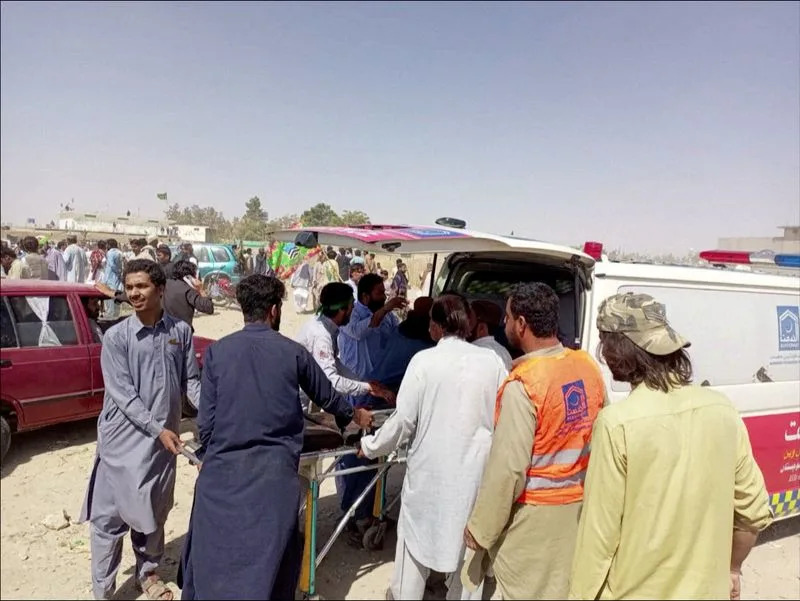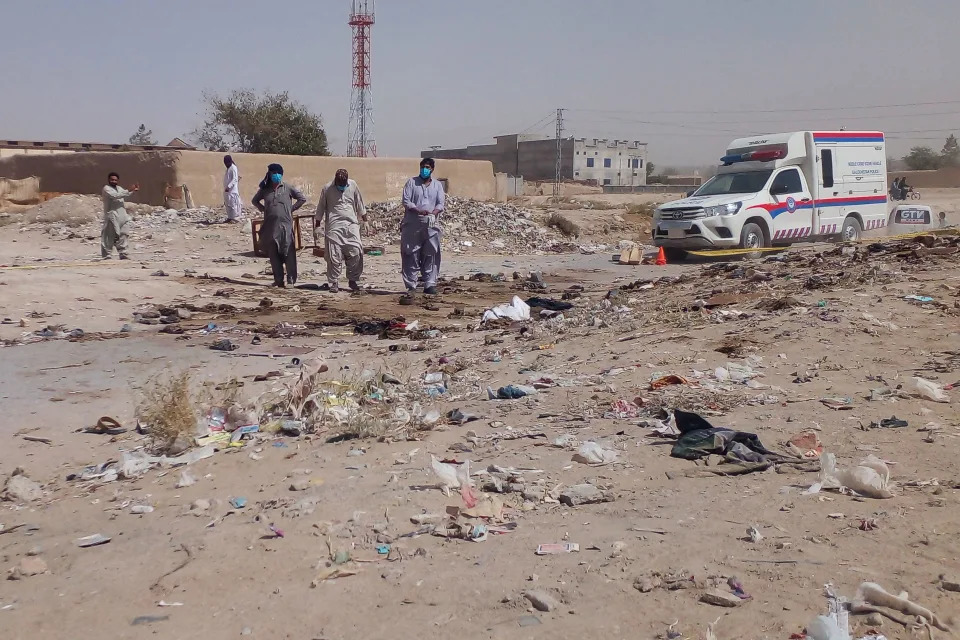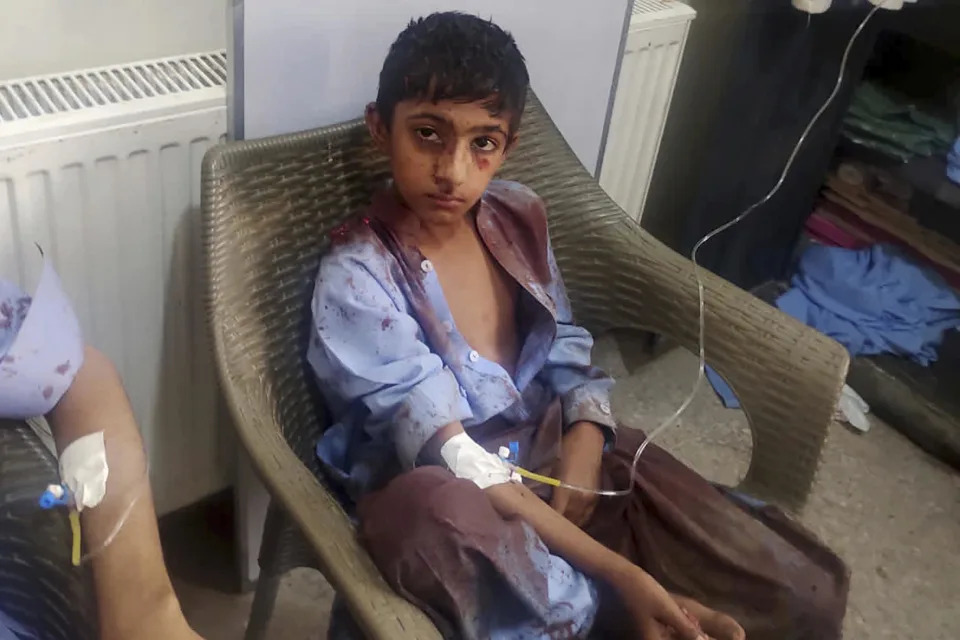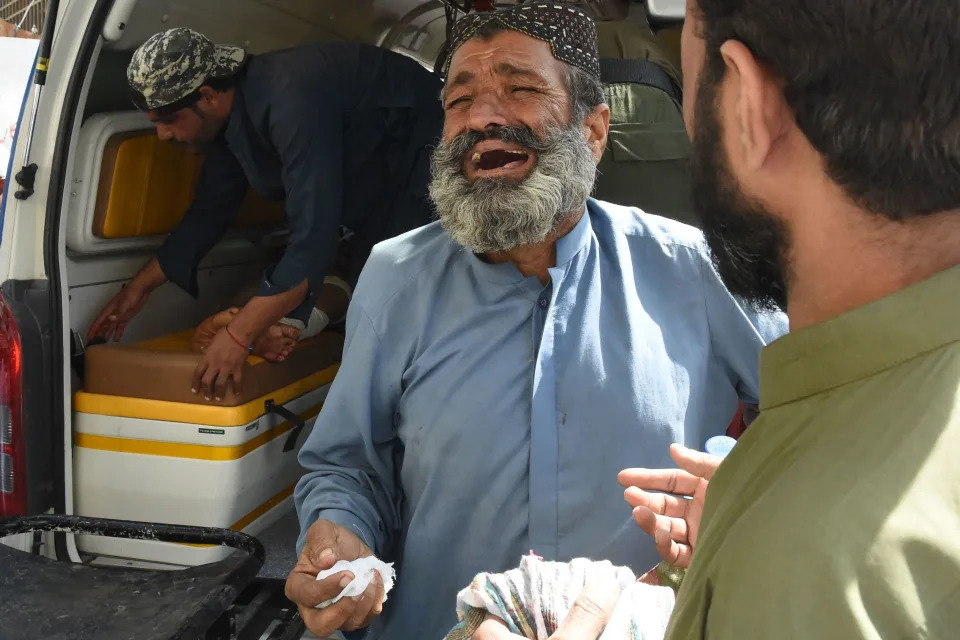Factbox-Major attacks in Pakistan during 2023

Suicide blast in southwest Pakistan
By Ariba Shahid
Fri, September 29, 2023
KARACHI, Pakistan (Reuters) - Islamist militants have staged a series of attacks in Pakistan since last year when a ceasefire between the Pakistani Taliban, the Tehreek-e-Taliban Pakistan (TTP) and the government broke down.
Here are details of some of the attacks that took place before suicide bombings at two mosques on Friday for which no one has claimed responsibility. The TTP, whose stated aim is to impose Islamic religious law in Pakistan as the Taliban have done in Afghanistan, denied any role in Friday's attacks.
JANUARY
A suicide bomber blew himself up inside a crowded mosque in a highly fortified security compound in the north-western city Peshawar on January 30, killing at least 100 people, mostly policemen, while 57 people were injured.
The attack was the deadliest in Peshawar since twin suicide bombings at All Saints Church killed scores of worshippers in September 2013, in what was one the deadliest attacks on Pakistan's Christian minority.
The Jamaat-ul-Ahrar, a faction of the TTP, claimed responsibility for the bombing. TTP spokesman Mohammad Khorasani distanced the group from the attack, saying it was not its policy to target mosques or other religious sites.
MARCH
A suicide bomber rammed a motorcycle into a police truck in southwestern Pakistan on March 6, killing nine policemen in Sibbi, a city some 160 km (100 miles) east of Quetta, the capital of Balochistan province.
Islamic State, which is fighting the Taliban in neighbouring Afghanistan, claimed responsibility for the attack, according to the SITE Intelligence Group.
APRIL
Four people were killed and 15 injured in a bombing targeting a police vehicle in a marketplace in Quetta on April 10. In a successive attack, a station house officer (SHO) was targeted in a roadside blast in Quetta.
Separatist group the Balochistan Liberation Army (BLA) claimed responsibility for the attacks, which was the third attack in less than 24 hours on police in Quetta.
APRIL
Two explosions in a counter-terrorism ammunition depot in the northwestern Swat valley killed at least 17 people, mostly policemen, and wounded over 50 on April 25. The valley had long been controlled by Islamist militants before they were flushed out in a military operation in 2009.
The valley police chief said experts visited the spot but did not find any evidence of a militant attack.
JULY
On July 31, At least 63 people died in a suicide bombing at a political rally organized by the conservative Jamiat Ulema Islam-Fazl (JUI-F) party, which is known for its links to hardline Islamists, but which condemns militants seeking to overthrow the Pakistani government.
The religious group was allied with the government at the time.
Islamic State claimed responsibility for the suicide attack, which compounded security concerns in the run-up to a general election expected in January. It was the most deadly attack to target a political rally since an election campaign in 2018.
AUGUST
Nine soldiers were killed when a suicide bomber on a motorcycle set off his explosives next to a convoy in northwestern Pakistan on Aug 31.
(Reporting by Ariba Shahid in Karachi; editing by Philippa Fletcher)
Suicide bomber kills more than 50 people near mosque in Pakistan
KARACHI, Pakistan (Reuters) - Islamist militants have staged a series of attacks in Pakistan since last year when a ceasefire between the Pakistani Taliban, the Tehreek-e-Taliban Pakistan (TTP) and the government broke down.
Here are details of some of the attacks that took place before suicide bombings at two mosques on Friday for which no one has claimed responsibility. The TTP, whose stated aim is to impose Islamic religious law in Pakistan as the Taliban have done in Afghanistan, denied any role in Friday's attacks.
JANUARY
A suicide bomber blew himself up inside a crowded mosque in a highly fortified security compound in the north-western city Peshawar on January 30, killing at least 100 people, mostly policemen, while 57 people were injured.
The attack was the deadliest in Peshawar since twin suicide bombings at All Saints Church killed scores of worshippers in September 2013, in what was one the deadliest attacks on Pakistan's Christian minority.
The Jamaat-ul-Ahrar, a faction of the TTP, claimed responsibility for the bombing. TTP spokesman Mohammad Khorasani distanced the group from the attack, saying it was not its policy to target mosques or other religious sites.
MARCH
A suicide bomber rammed a motorcycle into a police truck in southwestern Pakistan on March 6, killing nine policemen in Sibbi, a city some 160 km (100 miles) east of Quetta, the capital of Balochistan province.
Islamic State, which is fighting the Taliban in neighbouring Afghanistan, claimed responsibility for the attack, according to the SITE Intelligence Group.
APRIL
Four people were killed and 15 injured in a bombing targeting a police vehicle in a marketplace in Quetta on April 10. In a successive attack, a station house officer (SHO) was targeted in a roadside blast in Quetta.
Separatist group the Balochistan Liberation Army (BLA) claimed responsibility for the attacks, which was the third attack in less than 24 hours on police in Quetta.
APRIL
Two explosions in a counter-terrorism ammunition depot in the northwestern Swat valley killed at least 17 people, mostly policemen, and wounded over 50 on April 25. The valley had long been controlled by Islamist militants before they were flushed out in a military operation in 2009.
The valley police chief said experts visited the spot but did not find any evidence of a militant attack.
JULY
On July 31, At least 63 people died in a suicide bombing at a political rally organized by the conservative Jamiat Ulema Islam-Fazl (JUI-F) party, which is known for its links to hardline Islamists, but which condemns militants seeking to overthrow the Pakistani government.
The religious group was allied with the government at the time.
Islamic State claimed responsibility for the suicide attack, which compounded security concerns in the run-up to a general election expected in January. It was the most deadly attack to target a political rally since an election campaign in 2018.
AUGUST
Nine soldiers were killed when a suicide bomber on a motorcycle set off his explosives next to a convoy in northwestern Pakistan on Aug 31.
(Reporting by Ariba Shahid in Karachi; editing by Philippa Fletcher)
Suicide bomber kills more than 50 people near mosque in Pakistan
Guest Author, Maria Usman
Updated Fri, September 29, 2023
Islamabad, Pakistan — A religious gathering to celebrate the birthday of Islam's Prophet Mohammad turned deadly Friday in Pakistan when a suicide bomber exploded a powerful device near a mosque, killing at least 52 people and leaving some 70 more injured in an attack targeting worshippers and police. Another attack elsewhere in the country, targeting another mosque, left at least 5 people dead.
Local officials said the blast in the Mastung district of Pakistan's southwest Baluchistan province, which has faced a decades-long nationalist rebellion as well as multiple attacks by the ISIS faction in the region, had targeted the procession as worshipers left the mosque.

No group immediately claimed responsibility for Friday's explosion but the Pakistani Taliban, a collection of religious extremist sub-groups that's separate from the Afghan Taliban but closely allied with the group that retook power in Afghanistan in August 2021, denied responsibility.
ISIS-Khorasan, or ISIS-K, a branch of the terror group that operates in Pakistan and Afghanistan, is also active in the province has claimed previous deadly attacks in Baluchistan and elsewhere.
The Baluch nationalists who have fought for years for independence in the oil-rich province bordering Afghanistan and Iran typically target security officials rather than civilians.
Video aired by Pakistani TV stations and posted on social media showed bloodied victims of the explosion and body parts strewn across the site of the blast.

Dr Saeed Mirwani, chief executive of the local Nawab Ghous Bakhsh Raisani Memorial Hospital, told reporters that dozens of casualties were being treated at the facility, while more than 20 more seriously injured victims were sent to the provincial capital of Quetta for more advanced treatment.
"The process of moving bodies and injured persons is under way," the hospital CEO said.
Hours after the suicide blast in Baluchistan province, at least one more explosion ripped through a mosque in Khyber Pakhtunkhwa province, which also borders Afghanistan, killing at least five people, a regional official said. The mosque's roof collapsed in the blast, leaving about 30 to 40 people buried under rubble.
Interim information minister for the provincial government Feroze Jamal said there were two suicide bombers involved in the attack, one who was killed in a shootout with police at the entrance to the mosque in the city of Hangu, and another who then detonated his device inside the building as people gathered to tend to the wounded.
Pakistan's president Arif Alvi condemned both attacks and asked authorities to provide all possible assistance to the wounded and the victims' families.
In a statement, caretaker Interior Minister Sarfraz Bugti denounced the bombing, calling it a "heinous act" to target people in the religious procession.

The government had declared Friday a national holiday to mark Prophet Mohammad's birthday.
The Human Rights Commission of Pakistan said it was "unacceptable that the residents of Baluchistan are compelled to live in constant fear amid deteriorating law and order."
"Those responsible for this heinous attack must be brought to justice. HRCP believes, however, that hyper-securitization will not resolve the security problem in the province," it added in a statement shared on social media.
Soon after news of the explosions in Baluchistan and Khyber Pakhtunkhwa, police in Pakistan's most populous province, Punjab, and in its biggest city Karachi, said they were stepping up security around mosques amid Friday prayers.
Friday's bombing was among the worst attacks in Pakistan in a decade. In 2014, 147 people, mostly schoolchildren, were killed in a Taliban attack on an army-run school in the northwest city of Peshawar.
In late January, more than 100 people were killed, mostly police, at a mosque inside a high-security compound housing the Peshawar police headquarters. In July, at least 54 people were killed when a suicide bomber dispatched by ISIS-K targeted an election rally for a pro-Taliban party in the northwest of the country.
No comments:
Post a Comment